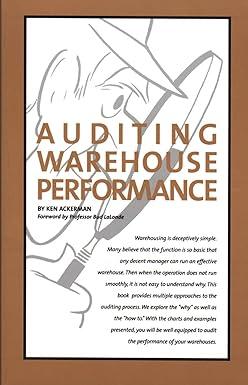1. If a company has an underfunded defined-benefit pension plan: A. no payment may be made to retirees until the company deposits all of the necessary assets into the pension fund. B. the difference between fund assets and amounts owed to retirees will still be paid by the federal Pension Benefit Guaranty Corporation. C. the value of the ABO (but not of the PBO) must be precisely the same as the amount of assets set aside to pay pension benefits. D. All of the above are true. E. None of the above is true. _2. Which of the following is a TRUE sentence with regard to a defined contribution pension plan? A Both the employer and employee must make annual payments to the plan. B. It does not matter to the employee whether the company has a defined- benefit plan or a defined contribution plan, because he or she still has retirement benefits. C. A 401(k) plan is an example of a defined-contribution plan. D. All of the above are true. E. None of the above is true. 3. The Public Company Accounting Oversight Board: A establishes accounting principles only for issuers. B interacts with the IASB in an effort to bring about convergence. C. must report to the Securities and Exchange Commission as a matter of federal law. D. All of the above are true. E. None of the above is true. _3 4. Unlike defined benefit pension plan assets, defined contribution pension plan assets: A. are held by the individual participants in income-producing investment accounts. B. are reported in the sponsoring company's financial statements. C. must be invested entirely in the sponsoring company's securities. D. All of the above are true. E. None of the above is true. 1. If a company has an underfunded defined-benefit pension plan: A. no payment may be made to retirees until the company deposits all of the necessary assets into the pension fund. B. the difference between fund assets and amounts owed to retirees will still be paid by the federal Pension Benefit Guaranty Corporation. C. the value of the ABO (but not of the PBO) must be precisely the same as the amount of assets set aside to pay pension benefits. D. All of the above are true. E. None of the above is true. _2. Which of the following is a TRUE sentence with regard to a defined contribution pension plan? A Both the employer and employee must make annual payments to the plan. B. It does not matter to the employee whether the company has a defined- benefit plan or a defined contribution plan, because he or she still has retirement benefits. C. A 401(k) plan is an example of a defined-contribution plan. D. All of the above are true. E. None of the above is true. 3. The Public Company Accounting Oversight Board: A establishes accounting principles only for issuers. B interacts with the IASB in an effort to bring about convergence. C. must report to the Securities and Exchange Commission as a matter of federal law. D. All of the above are true. E. None of the above is true. _3 4. Unlike defined benefit pension plan assets, defined contribution pension plan assets: A. are held by the individual participants in income-producing investment accounts. B. are reported in the sponsoring company's financial statements. C. must be invested entirely in the sponsoring company's securities. D. All of the above are true. E. None of the above is true







